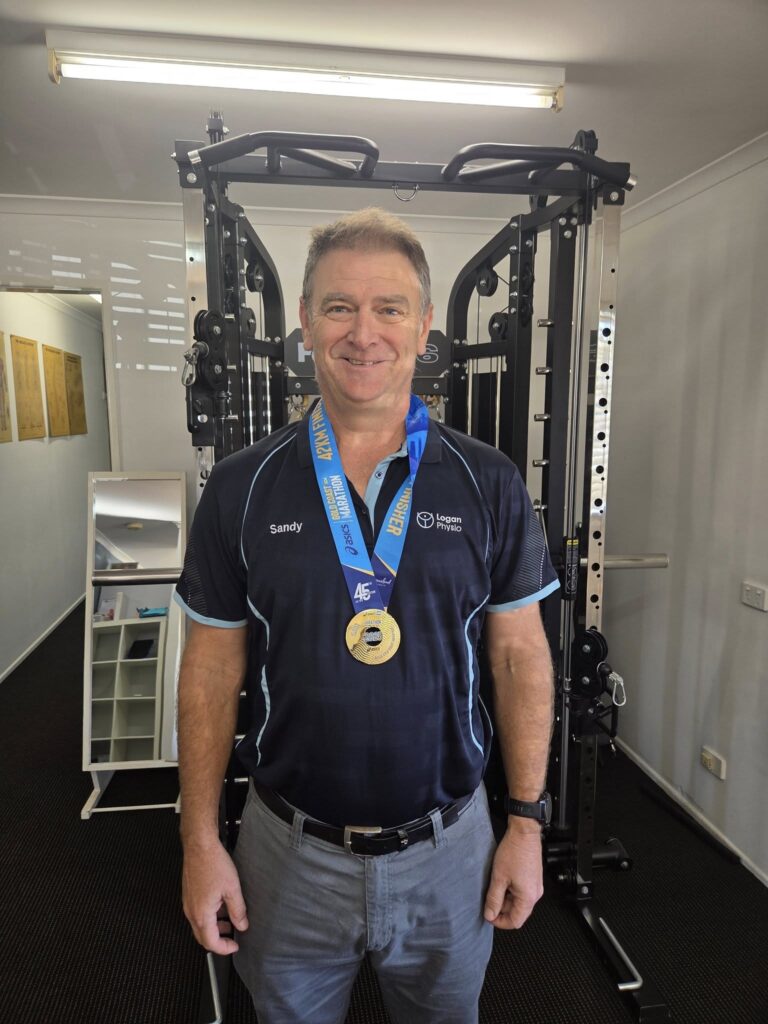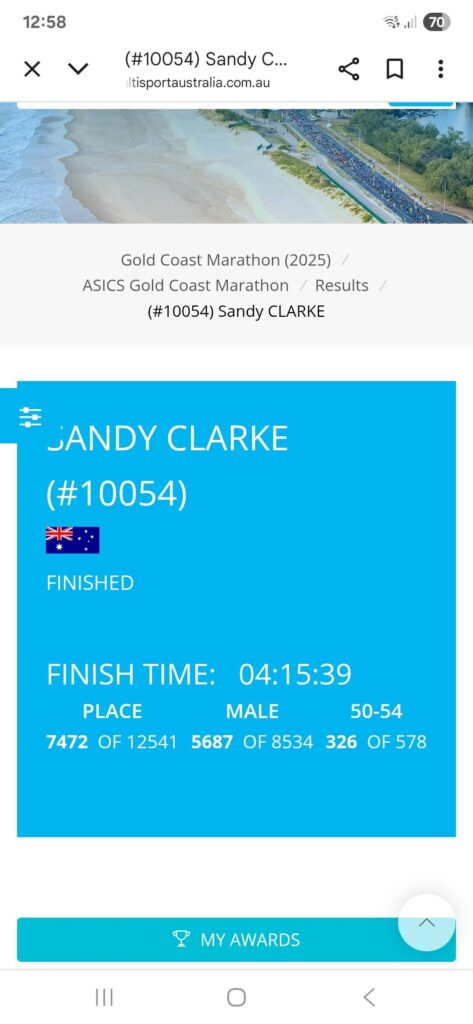Hi, I’m Sandy from Logan Physio, and just over a week ago, I completed the Gold Coast Marathon. While I’ve since returned to some light running and the legs are feeling better, I wanted to take a moment to reflect on the experience. This wasn’t just another run – it was a significant physical and mental challenge, and I walked away (literally!) with some valuable insights.
Whether you’re a first-time marathoner or a seasoned runner looking for a refresher, here are the five key takeaways I learned from this year’s race – lessons that might just help you prepare smarter, run stronger, and recover better.
1. Marathon Training Is More Than Just Training
Yes, training matters. I spent months logging kilometres, working on my endurance, strength, and pacing. But preparation for a marathon extends far beyond your running shoes and GPS watch.
If you’re thinking of running a marathon, don’t overlook the logistics:
- Start line access: Know where to go and when to arrive – crowds and nerves can derail even the most prepared runners.
- Course layout: Study the route, especially any inclines, tight turns, or aid station locations.
- Hydration and fuelling: Know when and where you’ll access water, electrolytes, and gels. I had support from Justine and others who helped get me fluids at key times, which made a big difference.
Preparation is about minimising surprises so you can focus on running your best race. Build your race plan like a checklist – if you’ve thought it through, you’ll feel more confident on the start line.
2. Don’t Start Too Fast – Stick to Your Heart Rate Zones
The second lesson is a classic but so easy to forget in the excitement: don’t go out too hard.
I was not even feeling that great at the start but I pushed forward with my plan, but his meant running above Zone 2 heart rate (for me, over 150 bpm). For those unfamiliar with training zones, Zone 2 is your aerobic, sustainable effort level, the kind you can maintain for long periods without crashing.
When you go above that zone too early, you burn through your energy reserves fast. That’s exactly what happened to me. Holding that elevated heart rate for too long came at a cost – and it caught up to me later in the race.
If you’re training with a heart rate monitor (and I highly recommend it), make sure you’re familiar with your zones and stay disciplined on race day. It’s better to start conservatively and finish strong than to hit the wall early and struggle through the back half.
3. Support on the Course Makes a Huge Difference
Running may be a solo sport, but on race day, your support crew can mean everything.
I had friends helping deliver drinks during the race, and that encouragement – both practical and emotional – was vital. A marathon is not just about how well your legs can hold up, but also how strong your mindset stays when things get tough.
Whether it’s friends along the course, volunteers at aid stations, or just people cheering from the sidelines, those moments of connection are energising. If you’re running your first marathon, let your people know where they can be to support you – and don’t be afraid to rely on them.
4. When Things Go Pear-Shaped, Persevere
Marathoners often talk about “hitting the wall.” For me, that moment came around the 27km mark. I was tired, low on energy, and had to alternate between walking and running just to keep moving forward.
But here’s the truth: that’s normal. Most runners hit a point where it feels like everything is unravelling. What matters is how you respond to it.
I had to reset my expectations and focus on simply putting one foot in front of the other. I took walking breaks, refocused my breathing, and reminded myself why I was doing this. That mindset shift – moving from performance to perseverance – is a big part of why I finished.
So if your race doesn’t go exactly to plan, don’t panic. Adjust, adapt, and keep going. The finish line is still within reach.
5. Celebrate, Recover, and Reflect
Crossing the finish line was an amazing feeling. It’s something you want to soak in and remember, so take the time to really celebrate your achievement.
I took the next day off work, booked a massage, and started easing into some gentle recovery activities – stretching, yoga, and low-impact movement. These are crucial not just for your physical recovery, but for your mental reset too.
Don’t rush back into training. Give your body what it needs. Respect the effort you put in and reward yourself with rest. You earned it.


Bonus Tips for Marathon Training and Recovery
Based on my Gold Coast Marathon experience, here are a few extra pointers that might help you if you’re planning your own event:
- Nutrition matters: Start with adequate carbohydrates in the days before the race. Use gels or sports drinks consistently throughout the event to avoid crashing.
- Practice everything before race day: That includes your breakfast, your gear, and your pacing plan. No surprises!
- Train your mind: Include mental strategies in your training – mantras, breathwork, and visualisation can help you through the tough patches.
- Don’t skip strength and mobility: Core stability, glute activation, and ankle mobility all play a huge role in keeping your form efficient and injury-free.
You Learn So Much From Every Race
Every marathon teaches you something new – not just about running, but about yourself.
My Gold Coast Marathon experience reminded me of the importance of planning, patience, and persistence. There were highs and lows, but they all formed part of a meaningful journey. I’m already thinking about how to improve next time, but for now, I’m proud of what I accomplished.
If you’re considering taking on a marathon or even a shorter distance event, I encourage you to go for it. And if you’re working through an injury, needing help building a plan, or just want to get moving again, we’re always here at Logan Physio to help you THRIVE.
Need Help With Your Marathon Journey?
Whether you’re:
- Recovering from a race
- Dealing with a running injury
- Starting your first 5K or training for your 10th marathon
The team at Logan Physio can support you with:
- Running assessments
- Strength and conditioning
- Injury rehabilitation
- Personalised training plans
- Recovery strategies (including massage, stretching advice, and more)
???? Visit us at 2 Mallee Street, Crestmead
???? Call us on 07 3200 8541
???? Learn more: www.loganphysio.com.au
Logan Physio – Helping runners of all levels train smart, move better, and finish strong.


